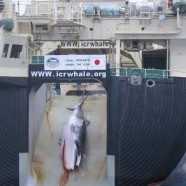Poincaré v. Montaigne
Information note n° 5
Whales at the International Court of Justice
The Hague, The Netherlands, 1st hearing of Japan July 2nd – July 4th
From June 26-28, Australia’s first round of hearings, issues on the purpose of scientific research and on the rationale of hypothesising were raised by the Court. The “positive” contribution to science of JARPA II was put into question. The objectives of the JARPA II program are considered by Australia to be the equivalent of “examining only the European red squirrel to understand what is happening to the European ecosystem” and science which is not built on solid ground. For memory, one of the objectives of JARPA II is to better understand biological parameters in the Antarctic ecosystem (see Information note N°1 for information on Japan’s JARPA objectives). Australia quoted Henri Poincaré, the French Professor, who wrote in 1905 that “science is built up of facts, as a house is built of stones; but an accumulation of facts is no more science than a heap of stones a house”. According to Australia, Japan’s collection of dead whales is not contributing to the stepping stones of scientific progress but a simple proliferation of useless stones.
Japan Strikes Back
Information note n°4
Whales at the International Court of Justice
The Hague, The Netherlands, 1st hearing of Japan, July 2nd – July 3rd
Japan, a country surrounded by sea, states that they “would be the last to misuse whales as resources because [they] know [they] benefit from the fruits of the sea”. Japan goes back in time explaining that they joined the International Whaling Commission (IWC) in 1951 “at a time when, amidst the devastation of war, whale meat helped prevent starvation” for a country with scarce land resources. They go even further back in time and point at the irony of history as it was whaling that forced them to interact with the international community after three hundred years of isolation. Japan stated that in the 19th century, “major maritime powers engaged in massive scale whaling demanded that Japan open up its ports to supply their whalers”. And it is this very subject, whaling, which today puts in question Japan’s compliance with the international community and international law and has brought them, for the first time, before the International Court of Justice.
Japanese “Scientific Whaling” by its Right Name is “Commercial Whaling”
Information note n°3
Whales at the International Court of Justice
The Hague, The Netherlands, 1st hearing of Australia, June 26th – June 28th
In his opening statement for Australia, Mr Campbell projected an image of a Japanese vessel with “Legal Research under the ICRW”* painted on the side and yet another whale lying dead on the slipway. For Australia, this is the image and language of a country trying to convince itself that they are contributing to science and thereby respecting the law. The international community and more specifically the international scientific community is not convinced.
The End of the Japanese Fairy Tale
Information note n°2
Whales at the International Court of Justice
The Hague, The Netherlands, 1st hearing of Australia, June 26th – June 28th
Impressions on the Australian point of view during the hearings from June 26th 27th and 28th 2013
During the first three days of the Australia v. Japan court case at the International Court of Justice, Australia has been presenting arguments stating them loud and clear to wake Japan up from over twenty years’ of sleep. Japan, indeed, had fallen into a deep legal sleep like a “Sleeping Beauty”, and the international community should not wait until a “beautiful white whale” comes along to wake them up. Such was the metaphor used by Mme Boisson De Chazournes when she presented the court with Japan’s interpretation on the wording of the text of the International Whaling Commission (IWC). She stated that contrary to Japan’s reading of the 1946 IWC, the Convention enforces whale conservation and does not provide for the reinforcement of commercial whaling. As to the breaching of international law, and the continuation of whaling by Japan, Australia’s arguments are threefold. Firstly, the use of whale catchers and factory ships, secondly, a clear breaching of the 1986 moratorium on commercial whaling and thirdly, a violation of the Southern Ocean Sanctuary specifically with regard to fin whale catches.
Australia v. Japan
Information note n°1
Whales at the International Court of Justice
Today, Australia is voicing out the cry of the whales by defending them against so-called Japanese scientific whaling. Over the next 3 weeks, public hearings in the case concerning ‘Whaling in the Antarctic’ (Australia v. Japan: New Zealand intervening) will be heard in The Hague at the International Court of Justice. The judgment is expected to be delivered within 4 to 8 months. Australia is hoping that a decision be taken within the next four months, before the next whaling season in the Southern Ocean.
Arctic: Keep it In My Backyard (KIMBY)
The Arctic Council is meeting this week in Kiruna Sweden an appropriately choice for the venue considering that mans’ impacts on the Arctic climate will be high on the agenda. Kiruna hosts the largest underground iron mine in the world where in response to ground deformations caused by mining, the city will be relocated over the coming years. Later this week at Kiruna the eight Arctic States (Russia, Finland, Denmark for Greenland, Sweden, Norway, Iceland, the U.S. and Canada) will sign a ‘Marine Oil Pollution Preparedness and Response’ agreement. The agreement aims to strengthen cooperation, coordination and mutual assistance on pollution preparedness and response in the Arctic in order to protect the marine environment from pollution by oil. Despite this noble promise the agreement does little more than reinforce existing international agreements.
Embargo on the Sirens
Convention on International Trade in Endangered Species of Wild Fauna and Flora
CITES 2013 – Bangkok, 4.45 pm (local time)
Press Release n°4
Caribbean and Amazonian manatees have been listed under Appendix I of CITES since 1975.
It took 38 years for the West African manatee (Trichechus senegalensis) to get the same protection. The proposal from Senegal, Benin, and Sierra Leone was approved by consensus. Today, the population of West African manatees is estimated to be less than 10,000 individuals living in the estuaries and costal waters of 21 countries. Reaching up to 3m in length and between 300 and 500 kg, manatees, also known as sea cows, are exclusively herbivores. Some grand individuals can even reach up to 4m in length and weigh over 1,000kg. Consuming 30kg of aquatic plants each day, they are considered the best biological means of combatting the colonization of invasive species, such as the water hyacinth.
The Nisshin Maru: not to Catch but to Scrap
The Japanese government has announced that they are considering “major repairs” of the Nisshin Maru, the mother factory ship of the whaling fleet that works in Antarctica in the name of science. The work will be superficial because the Nisshin Maru should be ready in time for the departure to Antarctica which happens every year in November. The Japanese Fisheries Agency hopes that this fast cosmetic repair will resist 10 years.
However, the Nisshin Maru is old. She is fragile. She was launched in 1987.
Japan Harpoons the International Whaling Commission
During the 63rd Plenary Session of the International Whaling Commission, Japan has demonstrated its ability to debilitate initiatives for the protection of whales and distort debates on environmental threats to cetaceans. This year, a loophole in the rules of the IWC has been subtly exploited by Japanese jurists to push aside a proposed sanctuary in the South Atlantic.
Fish Eat Whales
The 63rd annual meeting of the International Whaling Commission (IWC) will take place from July 11th to 14th on the Channel Island Jersey.
Pro-whaling countries often state that whales must be culled to avoid competition with human fisheries. Japanese “scientific” documents show images of whales’ stomachs overflowing with small pelagic fish. According to Robin des Bois a defender of whales, one must continue to demonstrate that whales have positive effects not only on the world’s marine ecosystem but on all ecosystems. We cannot accuse whales of taking all and giving nothing to the oceans, while it is Man who takes all and gives nothing but pollution and increasing disturbances.











